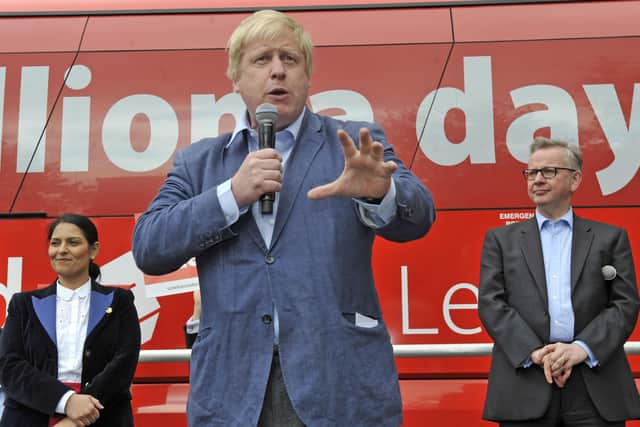Pro-worker policies will secure ‘red wall’ for Boris Johnson and end Brexit snobbery – David Skelton


Places like Wakefield (Labour since 1932), Don Valley (Labour since 1922) and Rother Valley (Labour since 1918) all turned Tory in results that would have been utterly unthinkable even a decade or two ago.
These were places that had found their political voice in the Brexit referendum and didn’t take lightly to the national Remain establishment.
Advertisement
Hide AdAdvertisement
Hide AdThe effectiveness of the “Get Brexit Done” message was the inevitable result of the sneering and snobbery that followed the EU referendum and the refusal of much of the political, business and cultural elite to accept the result.


Rather than properly engaging with the result, the response of too much of the establishment was to mock Leave voters. This was part of an often sneering disdain that saw working class Brexit voters derided as “stupid”, “bigoted” or worse.
The attitude that saw working class men derided as “low-information” “gammons” became even more pronounced after the 2019 election and was still notable around the time of the Hartlepool by-election.
These social attitudes might have been lingering beneath the surface for years, but there was little reason for them to be surfaced when the economy and politics put graduates and the South firmly in the box seat. In contrast, the referendum was a result in which working class voters in the North and Midlands had a decisive voice (all but one of the former coalfields voted to leave) and the losing side weren’t good at hiding their disdain.
Advertisement
Hide AdAdvertisement
Hide AdIt’s important that we call out the derisive attitude towards working people for the snobbery that it is. It’s what I call the “New Snobbery” in a new book.


This isn’t the old-style snobbery, where the likes of Nancy Mitford would differentiate people between whether they said loo or toilet or the kind of snobbery of Hyacinth Bucket or Margot Leadbetter, but the New Snobbery is much more insidious as it’s much more socially acceptable.
It’s also more harmful because it challenges people’s ability to participate in a fully engaged way in the democratic process. The problem isn’t just a political one. Mainstream comedy shows are packed full of metropolitan liberals “punching down” at Northern Brexit voters and taunts against working people are regarded as acceptable. Working class voices are still seldom heard in culture or in business, with an obsession with diversity often ignoring socio-economic barriers.
The foundations of the New Snobbery are educational and economic. Educationally, people from working class backgrounds are still disproportionately left behind. The class divide in education grows wider as children get older. Only 13 per cent of white-working class boys on free school meals attend university, compared to 85 per cent of people who attend private schools.
Advertisement
Hide AdAdvertisement
Hide AdOur economy has been transformed into one where working class jobs have lost esteem and status, often being characterised by insecurity and stagnating wages. An obsession with meritocracy, although important in principle, also risks ignoring jobs at the bottom and creating the myth that success is down purely to talent.
There are a number of steps that we can take to start putting right generations of policy failure and to develop a pro-worker politics and economics.
The Prime Minister’s ‘Levelling Up’ agenda suggests that he understands the importance of this. Pro-worker policy measures include taking steps to increase working class representation across politics, business and culture; pursuing an industrial policy that aims at reindustrialisation, with the creation of good quality manufacturing jobs in towns in “post-industrial” towns in Yorkshire and beyond; putting growth in median wages at the heart of our economic policy; repairing the dignity of work for all workers; and placing vocation at the core of our education system.
This policy shift would move beyond the New Snobbery, that sees workers as peripheral, towards a politics that puts the interests of working people at the heart of decision making.
Advertisement
Hide AdAdvertisement
Hide AdThe Conservatives achieved their biggest majority for decades because Red Wall voters in places like Wakefield, Don Valley and Rother Valley were fed up of being taken for granted. But these voters, tired of the New Snobbery from much of progressive Britain, aren’t guaranteed to stay in the Conservative camp and they rightly expect to see a trajectory of improvement in their wages, in their towns and in their local economies.
If the Government is able to deliver real and positive change, then there is every chance that the realignment could be a lasting one.
David Skelton is an author and political commentator. He tweets via @djskelton. The New Snobbery is published by Biteback.
Support The Yorkshire Post and become a subscriber today. Your subscription will help us to continue to bring quality news to the people of Yorkshire. In return, you’ll see fewer ads on site, get free access to our app and receive exclusive members-only offers. Click here to subscribe.
Comment Guidelines
National World encourages reader discussion on our stories. User feedback, insights and back-and-forth exchanges add a rich layer of context to reporting. Please review our Community Guidelines before commenting.